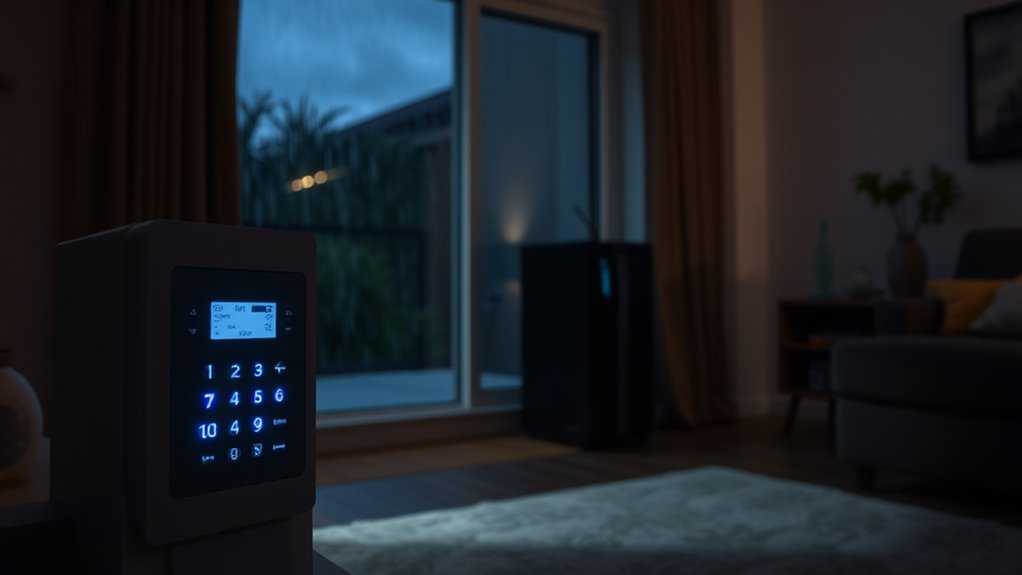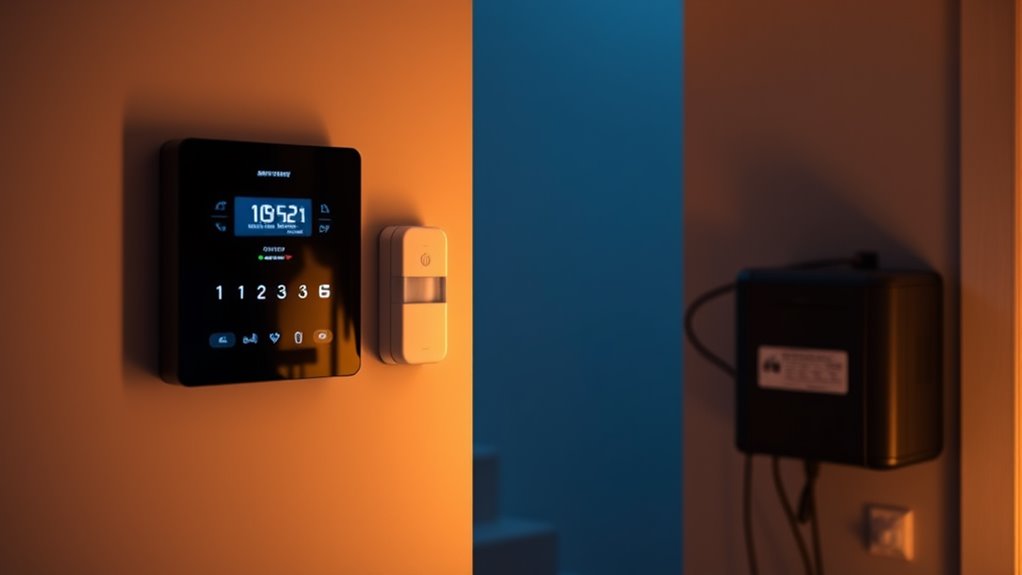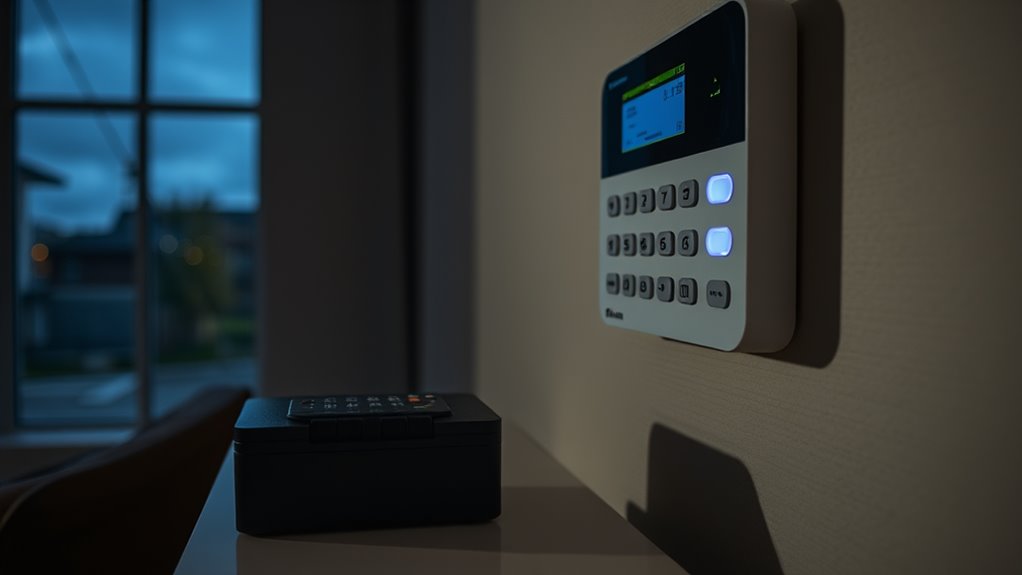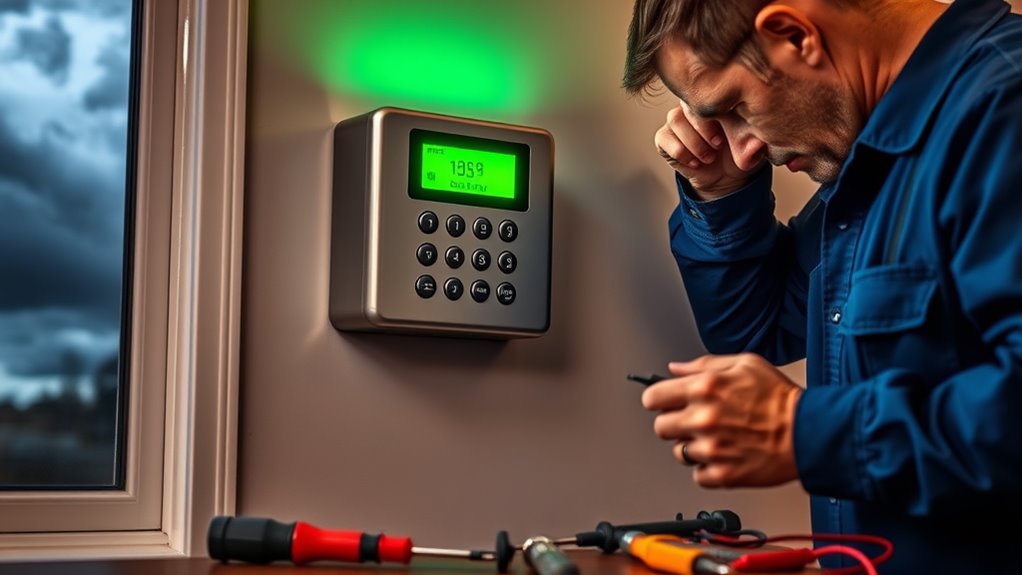Home alarms with battery backup are a must-have for keeping your home safe during power outages. When the lights go out, these alarms kick in automatically, ensuring your security system stays operational. It's like having a superhero for your home! Plus, they help keep your security cameras running, recording essential moments. Look for features like wireless connectivity and remote monitoring, making it easy to control from your phone. Don't forget to check your battery every six months, so you're always ready. Curious about what else can boost your home's security? There's more to explore that you'll find helpful!
Importance of Battery Backup

When it comes to home security, battery backup is vital. Imagine this: a storm knocks out your power, and suddenly, your alarm system goes silent. That's a big no-no when it comes to power reliability! Without battery backup, your home's security could be at risk. It's not just about keeping your home safe; it's also about emergency preparedness. You want peace of mind knowing that during a blackout, your alarm will still sound if someone tries to break in. Personal security alarms, which often include features like LED flashlights, are essential tools for emergency situations. Plus, a battery backup guarantees your cameras keep recording, so you won't miss anything important. To enhance your home's security, consider adding a Glass Breakage Alarm to your system, which is designed to provide protection by detecting vibrations from glass impact or breakage.
How Battery Backup Works
Understanding how battery backup works is essential for maximizing your home alarm system's effectiveness. When the power goes out, your alarm system relies on battery backup to keep running. These batteries kick in automatically, ensuring that your home stays protected even during outages. The key to successful battery backup lies in battery longevity and power efficiency. A good battery can last for years, but you need to check its condition regularly. Efficiency also matters; modern systems use less power, extending battery life. Additionally, having a portable size alarm system, like the 2n1 Personal Burglar Alarm, ensures that you can easily transport and utilize the alarm in different locations, providing continuous protection even during power outages. The Portable Door Guard with its compact design and alarm feature is an excellent example of a device that can be utilized for security in temporary accommodations, ensuring protection even in transit.
Key Features to Consider

Choosing the right home alarm system involves considering several key features that can enhance your security.
First, think about wireless connectivity. Systems that connect wirelessly can be easier to install and manage, without the hassle of messy wires.
Next, remote monitoring is a must. This feature lets you keep an eye on your home from anywhere using your smartphone or tablet. It's like having a personal security guard in your pocket!
Additionally, look for easy-to-use apps that allow you to receive alerts and control your system on the go.
Finally, make sure your alarm system has a reliable battery backup. This way, your home stays protected even during a power outage, giving you peace of mind when you need it most.
Types of Home Alarm Systems
Home alarm systems come in various types, each designed to meet different security needs and preferences. You can choose between wired systems, which are reliable but tricky to install, and wireless systems that offer flexibility and ease.
Smart alarms take it a step further, connecting to your phone for real-time alerts. If you're handy, consider DIY installations to save money while customizing your setup.
Monitoring options vary too, from professional services to self-monitoring apps. To boost security, you can use motion sensors and security cameras that detect movement and capture events.
Plus, alarm integrations allow your system to work with other devices, giving you a thorough security solution. So, find the right fit for your home and stay safe!
Benefits of Battery-Powered Alarms

One significant advantage of battery-powered alarms is their independence from electrical outlets, allowing you to place them anywhere in your home.
This flexibility means you can secure those tricky spots, like basements or garages, where outlets mightn't be handy. Plus, with wireless technology, you don't have to worry about messy wires or complicated setups. Just think about how easy it's to install these alarms—no electrician needed!
Another perk is cost efficiency. Battery-powered alarms typically require less maintenance and can save you money on your energy bill since they don't rely on constant electricity.
Installation Tips for Homeowners
When it comes to installing battery-powered alarms, proper placement is key for ideal performance. First, think about wiring considerations; even though these alarms run on batteries, some may still need a power source. Choose spots away from windows and doors to avoid false alarms from outside noise.
For placement strategies, install alarms on every level of your home, especially near sleeping areas. This way, you'll hear them if something goes wrong at night. Remember to keep them at least 10 feet away from cooking appliances to reduce nuisance alerts.
Finally, don't forget to test your alarms after installation to verify they're working properly. You want your home to be secure, even when the lights go out!
Maintenance and Testing

After you've installed your battery-powered alarms, keeping them in top shape is essential for your home's safety. Regular maintenance guarantees your alarms work when you need them most. Aim for a battery replacement every six months, and test your alarms at least once a month to confirm they're functioning properly.
Here's a quick reference table for your maintenance:
| Task | Frequency |
|---|---|
| Battery Replacement | Every 6 months |
| Testing Alarms | Once a month |
| Professional Inspection | Every 1-2 years |
Staying on top of these tasks will help prevent any surprises during power outages. A little effort goes a long way to keep your home secure and give you peace of mind!
Top Brands and Models
Choosing the right battery-powered alarm can make all the difference in your home's safety.
When you're looking at brand comparisons, you'll notice that popular names like ADT, Ring, and SimpliSafe often lead the pack. Each brand has its strengths, so it's crucial to read model reviews to find one that fits your needs.
For example, the Ring Alarm system is known for its user-friendly app, while ADT offers professional monitoring that can give you peace of mind. SimpliSafe stands out with its customizable options.
Don't just go for the flashiest model; consider your budget and safety requirements. With the right choice, you'll be prepared for anything—even during those pesky power outages!
Stay safe and secure!
Frequently Asked Questions
How Long Does the Battery Backup Last During a Power Outage?
The battery life during a power outage can vary, but it typically lasts between 24 to 48 hours. By choosing energy-efficient devices, you'll maximize power efficiency and guarantee your system stays operational longer.
Can I Replace the Battery Myself?
Yes, you can replace the battery yourself. For efficient battery maintenance, follow these replacement tips: check your alarm's manual, use the correct battery type, and make certain connections are secure for peak performance.
Do All Home Alarm Systems Have Battery Backup Options?
Not all alarm system types come with battery backup options. Check your model's specifications. For those with batteries, follow battery maintenance tips to guarantee your system remains functional during outages and stays reliable when you need it.
What Type of Battery Is Recommended for Home Alarms?
For home alarms, rechargeable lithium-ion batteries are recommended due to their longevity and reliability. To maintain them, check connections regularly and replace every 3-5 years to guarantee your system remains functional during emergencies.
How Often Should I Test the Battery Backup System?
You should test your battery backup system at least once a month. Regular testing guarantees it's functioning properly. Follow these battery maintenance tips to keep your alarm system effective and reliable during emergencies.
So Here Is What We Learned
In a world where power outages can strike at any time, having a home alarm with battery backup is a smart move. It keeps you secure, even when the lights go out. By choosing the right system, you'll enjoy peace of mind knowing your home is protected. Plus, maintenance is a breeze! So, don't wait for the next blackout—invest in a reliable alarm system today and keep your home safe, no matter what!




